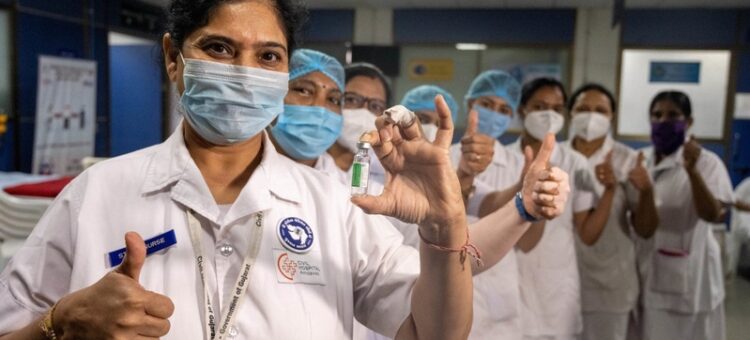New Delhi: The ‘Modi Model’ now gets a global pat, and leaders at the World Economic Forum at Davos say everyone else needs to follow the ‘Indian model’ to ensure vaccine equity and wider inoculation.
The story of India’s vaccination drive and also providing the same to countries in India’s neighbourhood like Nepal and Bangladesh and a host of African countries is not as simple as it sounds today.
Indian political class, from opposition parties such as communists, Congress and Samajwadi Party, tried to encourage a sentiment of anti-vaccination or vaccine phobia among citizens. Some leaders also said they would not take ‘Bhajpa (BJP) vaccines’.
The opposition parties were so blinded by their negativity that some Chief Ministers did not like incumbent Prime Minister Narendra Modi’s photo on the vaccine certificates.
There were states such as Delhi and West Bengal which made towering claims that they should control the entire vaccination drive, but when it came to procuring, they said the foreign manufacturers were not cooperating, unwilling to negotiate with states individually.
The fact of the matter is there was a ‘very small number’ of vaccine manufacturers even at the global level compared to its demand. Prime Minister Narendra Modi took charge of things finally in June 2021 and announced that all vaccination-related works would be done and controlled by the centre only.
He also announced that the Union Home Ministry would review the entire process on a daily and hourly basis.
“Imagine what would have happened in India if we didn’t have vaccines. If you look at the history of the last 50-60 years, you will know that it took decades for India to get vaccines from abroad,” the Prime Minister said.
India also assured the world that it was determined to become the global vaccine capital, and it had started supplying vaccines to other nations. The ‘Vaccine Maitri’ and other initiatives are now being appreciated.
Jeremy Farrar, Director at Wellcome Trust, said India deserves huge credit for expanding its vaccine manufacturing capacity.
Seth F Berkley, CEO of Gavi, the Vaccine Alliance, said commitments and plans were in place to ensure wider inoculation globally when the vaccines first got developed.
The prophets of doom might have got another knock on their nose.
In February 2021, the Indian government, in pursuance of its much talked about Vaccine Maitri policy, had donated Covid vaccines to countries like Dominica and the gesture was well appreciated by all overseas.
The government sources have always maintained that the Vaccine Maitri ought to positively impact India in winning new friends and strengthening the bond further among existing friends.
The then Foreign Secretary Harsh V Shringla had said during the peak of global assistance in the wake of the second wave (summer of 2021) that India is getting the international assistance and support simply based on the age-old humanitarian formula, “We have given assistance, and so we are getting assistance”.
At the WEF, Davos, yet again, Oxfam International Executive Director Gabriela Bucher flagged off her concerns on ‘vaccine equality and vaccine equity’ at the global level. Bucher said India had been a ‘good example’, and the same needs to be followed by all to ensure vaccine equality and vaccine equity and their availability for all.
Speaking in the same panel, NITI Aayog CEO Amitabh Kant said, “When the second wave hit India, and it was a disastrous wave. It was very important to take care of our huge population, and at that time we had only two vaccine manufacturers.”
“Now, we have ten manufacturers, 14 other vaccines are in various stages of development, and we are now determined to become the vaccine capital of the world. We also believe that no Indian is safe till the time everyone else in the world is safe,” he added.
“What worries me is the impact of the pandemic on the learning ability of children and the time they lost in studies and the impact on the women. We will need to find some technological answers to all these worries,” Kant further said.
In reference to those questioning the government’s decision to ‘export’ vaccines, External Affairs Minister Dr S Jaishankar had said rather acidly: “Somebody will ask – why am I exporting to India. That is so short-sighted. Only non-serious, irresponsible people can make that argument”.
Prime Minister Modi, of course, has made regional and global outreach in confronting the Covid challenges since March 2020 itself at the global, Asian and even South Asian levels.




















Comments